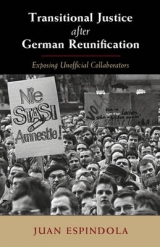Transitional Justice after German Reunification
Cambridge University Press (Verlag)
9781107083127 (ISBN)
How do societies transitioning from oppressive to democratic rule hold accountable those citizens who contributed to maintaining injustice in the ancient regime by secretly denouncing fellow citizens? Is their public identification a way of fulfilling respect for those who suffered harm as a result of their collaboration? And is public identification respectful of denunciators themselves? This book pursues these questions through a multidisciplinary investigation focusing on the denunciators for the East German secret police and the Ministry of State Security and the way in which they have been publicly unveiled in contemporary German society. The book evaluates the justifications that social actors offer to support or oppose public identifications; how targeted collaborators react to this social practice; and whether it achieves its intended purpose. At every stage, the book asks whether the motivations and the consequences of public identifications honor or undermine the value of respect for people.
Juan Espindola is an assistant professor at the Center for Research and Teaching in Economics in Mexico City. He has held postdoctoral fellowships at the Centre for Advanced Studies Justitia Amplificata at the Goethe-University of Frankfurt, and at the Institute for Social Research at the National University of Mexico. He has been a visiting scholar at the Max Planck Institute for Comparative Public Law and International Law in Heidelberg and at the Institute of Political Studies in Paris. His work has appeared in journals such as Ethical Theory and Moral Practice, Res Publica, and the German Studies Review, among others. His primary research areas include transitional justice, historical rectification, and education. He received his PhD in Political Science from the University of Michigan.
1. Exposing unofficial collaborators; 2. The regime, the secret police, and coming to terms with the past; 3. The case(s) of the litigating spies: public shame, reputation, and respect; 4. Civic interpellations: denunciation as self-disrespect; 5. Stasi agents as responsible agents? Responsibility and respect; 6. An apology for public apologies: a matter of respect?; 7. The politics of reconciliation: offering respect?; 8. Conclusion: thou all-spying knave, of all deeds of shame.
| Erscheint lt. Verlag | 16.4.2015 |
|---|---|
| Zusatzinfo | 2 Tables, unspecified |
| Verlagsort | Cambridge |
| Sprache | englisch |
| Maße | 158 x 235 mm |
| Gewicht | 550 g |
| Themenwelt | Recht / Steuern ► EU / Internationales Recht |
| Recht / Steuern ► Strafrecht ► Besonderes Strafrecht | |
| Recht / Steuern ► Strafrecht ► Strafverfahrensrecht | |
| ISBN-13 | 9781107083127 / 9781107083127 |
| Zustand | Neuware |
| Informationen gemäß Produktsicherheitsverordnung (GPSR) | |
| Haben Sie eine Frage zum Produkt? |
aus dem Bereich




![Lernen mit Fällen : materielles Recht & Klausurenlehre ; [Musterlösungen im Gutachtenstil] - Strafrecht Besonderer Teil 1 - Winfried Schwabe](/media/122164275)